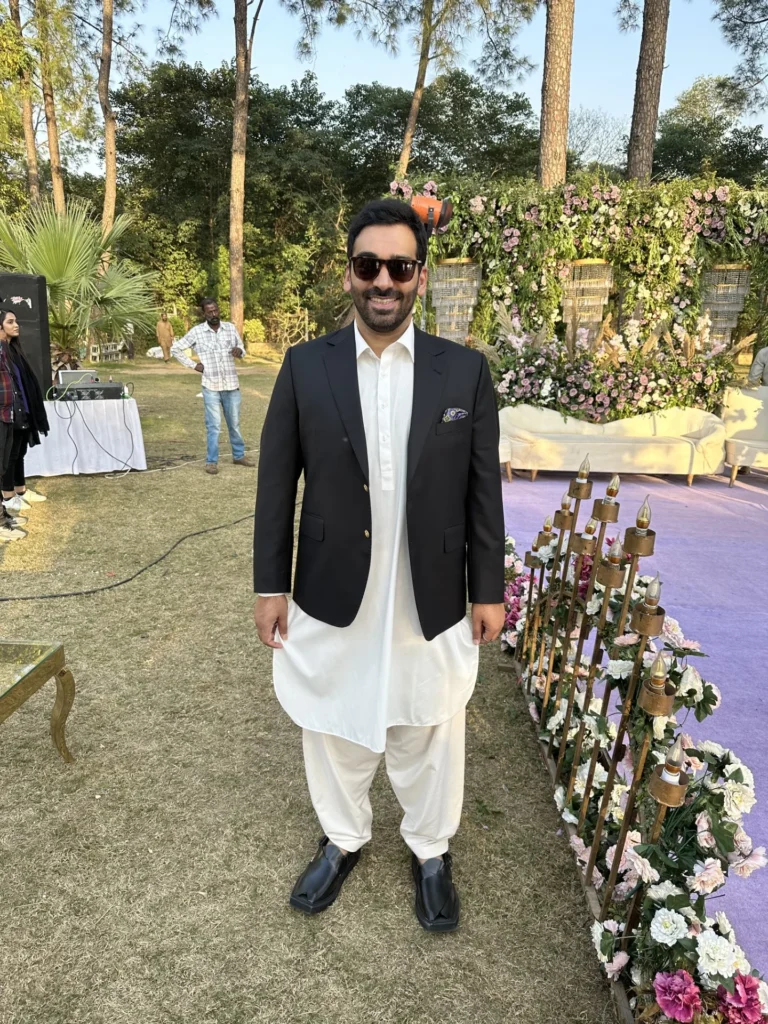Yasir Jawaid learned early that resilience does not come from avoiding struggles. The critical care physician, who moved from a small company town in rural Pakistan to the bustling corridors of American hospitals, has built a career on transforming obstacles into stepping stones.
“Resilience isn’t about never struggling, it’s about recovering with purpose,” Jawaid says. “Cultivate mentorship, be open to feedback, and allow your values to guide you through uncertainty.”
Born in Houston, Texas, Jawaid moved to Pakistan at an early age, spending his formative years in the heart of rural Sind’s desert region. His family’s several relocations before settling in Karachi exposed him to diverse environments and communities. Karachi, with its palpable energy, left a lasting impression on his younger self, an energy he would later recognize in New York City during his fellowship training.
His path back to the United States began with medical graduate training in West Virginia, where the beauty of the Appalachian region mesmerized him. From there, he moved to New York City for fellowship training, finding the city’s unbeatable energy reminiscent of his beloved Karachi. His journey eventually led him to Washington, DC, where he encountered a diverse array of people engaged in government, politics, and medicine.
Building Resilience Through Cultural Adaptation
The transition from Pakistan to American medical training presented unique challenges that would ultimately strengthen Jawaid’s resilience toolkit. Early in his U.S. training, cultural differences occasionally led to miscommunication, a common experience for international medical graduates that can derail promising careers.
Rather than allowing these obstacles to discourage him, Jawaid developed a systematic approach to overcome them. He actively sought feedback from colleagues and supervisors, carefully observed others’ communication styles, and worked to improve his own approach without compromising clarity or professionalism.
“I’ve learned to stay focused on patient care, regardless of external pressures,” he says. This adaptability became a cornerstone of his professional identity. His experience navigating between different healthcare systems also taught him valuable lessons about humility and problem-solving. In resource-limited settings, creativity and collaboration become essential. In highly specialized environments, precision and protocol take precedence. Understanding both contexts has enabled him to be a more versatile and effective physician.
Maintaining Focus During Difficult Times
The intensive care unit presents unique challenges that can overwhelm even experienced healthcare professionals. The constant pressure of life-and-death decisions, combined with the emotional toll of witnessing suffering, requires extraordinary mental fortitude. Yasir Jawaid has developed specific strategies to maintain motivation and focus during these difficult times.
The structure forms the foundation of his approach. He prioritizes rest, reflection, and routine; understanding that sustainable performance requires intentional recovery. This isn’t merely about work-life balance; it’s about creating the mental space necessary for clear thinking in high-pressure situations.
When faced with difficult cases or systemic frustrations, he returns to the fundamental question of why he chose this path. This connection to purpose provides clarity and motivation when external circumstances become overwhelming.
“Staying connected to my purpose in critical care and maintaining a realistic, forward-looking mindset helps me stay grounded,” Jawaid says.
Rather than becoming trapped by current difficulties, he focuses on what can be learned and how challenges can inform future improvements. This perspective transforms obstacles from sources of discouragement into opportunities for growth.
Supporting Team Resilience in the ICU
Leadership in critical care extends beyond clinical competence to fostering an environment where teams can thrive under pressure. Yasir Jawaid emphasizes psychological safety as a fundamental component of effective ICU leadership, recognizing that healthcare professionals must feel secure enough to communicate openly about concerns and mistakes.
He leads by example, demonstrating the behavior and attitudes he expects from his team. This includes acknowledging uncertainty when it exists, admitting mistakes when they occur, and showing vulnerability when appropriate. Such modeling creates permission for others to do the same.
Open dialogue becomes crucial in high-stress environments where miscommunication can have serious consequences. By encouraging team members to voice their concerns, ask questions, and share observations, Jawaid fosters a culture where problems are identified and addressed promptly.
Perhaps most importantly, he acknowledges the emotional toll of intensive care work. Rather than expecting team members to suppress their reactions to difficult cases, he normalizes these responses and creates space for mutual support.
Yasir Jawaid Turns Setbacks Into Breakthroughs
Professional setbacks are inevitable in medicine, but Jawaid has learned to view them in a positive light.
A particularly meaningful example occurred when he didn’t receive a position he initially pursued. Rather than viewing this as a failure, he used it as motivation to broaden his skill set and pursue additional training. This detour ultimately positioned him for a more fitting leadership role with greater impact.
This experience illustrates his evolved mindset about adversity. Initially, he saw challenges as something to endure; obstacles to overcome on the path to predetermined goals. Now, he views them as signals to adapt and evolve, recognizing that they often point toward better opportunities or necessary skill development.
Every challenge reinforces his perspective and deepens his professional maturity. Rather than becoming discouraged by setbacks, he examines what they reveal about his development needs or potential alternative paths.
Before you go, this next article might answer your next question.
Transforming Challenges Into Innovation Opportunities
The practice of critical care medicine constantly presents challenges that can either frustrate healthcare providers or inspire innovation. Yasir Jawaid has developed a systematic approach to identifying and addressing these challenges, viewing them as opportunities to improve patient care and system efficiency.
He approaches problems as system gaps rather than isolated incidents. This perspective allows him to look beyond immediate frustrations to identify underlying issues that, when addressed, can benefit multiple patients and providers.
“Whether refining critical care protocols or improving communication workflows, challenges often signal room for meaningful change,” he says.
This systems thinking approach enables him to develop scalable solutions rather than temporary fixes. When communication breakdowns occur, he doesn’t simply address the immediate issue but examines the underlying processes that allowed it to happen. When protocols prove insufficient, he works to refine them for future cases.
His innovative mindset extends to both clinical and administrative aspects of care. He recognizes that improving patient outcomes often requires addressing workflow inefficiencies, communication barriers, or resource allocation issues. By viewing these challenges as opportunities rather than obstacles, he contributes to continuous improvement in critical care delivery.
The emphasis on scalability ensures that solutions benefit not just individual patients but entire systems. This approach maximizes the impact of problem-solving efforts and creates lasting improvements in care quality and provider satisfaction.
Cultivating Empathy as a Foundation for Resilience
In the high-pressure environment of intensive care, empathy might seem like a luxury rather than a necessity. However, Jawaid has discovered that cultivating empathy actually contributes to resilience, creating deeper connections that sustain healthcare providers through difficult periods.
“Empathy deepens connection, not only with patients but also with colleagues,” he says. “It reminds us why we chose this path, which helps anchor us during emotionally and ethically difficult cases.”
For patients and families facing critical illness, empathy provides comfort and reassurance during their most vulnerable moments. For healthcare providers, it creates meaning and purpose that transcends the technical aspects of medical care. The connection with colleagues through empathy builds the mutual support systems that sustain teams. When healthcare providers understand and acknowledge each other’s emotional experiences, they create networks of support that help prevent isolation and burnout.
Yasir Jawaid Guides the Next Generation of Healthcare Professionals
As an experienced physician who has navigated significant challenges, Yasir Jawaid now focuses on helping emerging healthcare professionals develop their resilience.
“I normalize setbacks as part of growth, encourage reflective practice and advocate for boundaries,” he says.
He encourages reflective practice, helping young professionals examine their experiences to extract learning and growth opportunities. This reflection transforms difficult experiences from sources of discouragement into valuable development tools.
Advocating for boundaries represents a crucial aspect of his mentorship approach. In a profession where dedication is often measured by willingness to sacrifice personal needs, he teaches that sustainable practice requires intentional limits and self-care.
His guidance emphasizes that resilience comes not from perfection but from consistent, value-driven practice. This perspective relieves young professionals of the pressure to never struggle while providing a framework for growth and development.
Through his mentorship, Jawaid helps create a new generation of healthcare professionals who understand that struggle is part of growth, that empathy strengthens rather than weakens providers, and that challenges often signal opportunities for innovation and improvement.
Today, from his base in Washington, DC, Jawaid continues to discover new possibilities in both his professional and personal life. Whether exploring interesting eateries with his family or developing innovative approaches to patient care, he maintains the curiosity and adaptability that have defined his journey from the deserts of Pakistan to the corridors of American medicine.
His story illustrates that resilience in healthcare comes not from avoiding challenges but from developing the tools and perspective to transform them into opportunities for growth, innovation, and deeper connection.
Curious hearts and bright minds—follow the path to more wisdom on Management Works Media.






